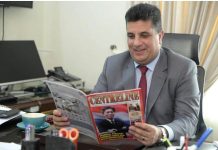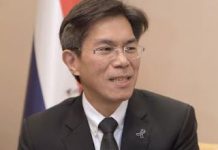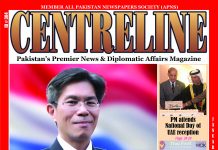Ansar Mahmood Bhatti
Ambassador of Tunisia Adel Elarbi talked to Centreline and Diplomatic News Agency (DNA) on the occasion of the 60th Anniversary of the Independence of the Republic of Tunisia. The ambassador talked about bilateral relations. He also talked about various avenues where both Tunisia and Pakistan can cooperate. Text of his interview is given below.
Let us begin with bilateral relations, how would you describe these relations and if you could share with our readers the initiatives taken by you or those you intend to take to further cement these relations?
Tunis and Pakistan enjoy excellent relations in all fields. In political field both countries have been cooperating with each other very closely. Tunisia and Pakistan are side by side ever since Tunisia became an independent country. With regards to economic relations, there is a definite need to improve and intensify the relations and the export level from both sides need to be geared up. Pakistan exports to Tunisia some leather and cotton products. As you may know Tunisia like other regional countries had to undergo a transitional phase that somehow affected the trade and business activity. But things now are returning to normalcy, which of course is a good omen for strengthening of relations with the outer world including Pakistan.
Tunisia owing to its strategic locations serves as a gateway to Africa, which will allow Pakistani businessman to not only explore new markets in Tunisia but also in other African counties. The government of Tunisia is introducing a number of structural changes in order to facilitate foreign investors. These structural reforms inter alia, would also help Tunisia overcome its unemployment issue, providing greater employment opportunities to the youth in projects that will be initiated by the foreign investors.
It will be interesting to know salient features of the Tunisian culture?
Culture is also an area which can serve as a bridge between the two countries. During my stay in Pakistan of slightly over a year, I have found many similarities in food, culture, dance, art etc. Some glimpses of this you must have seen at our Independence Day reception. What I have also observed is that not very many Pakistanis know much about Tunisia and vice versa, therefore, my special focus is on promoting and strengthening people to people relations. For this I would narrow the focus on cultural cooperation because that is the most suitable way to bring people of both countries closer.
Tunisia is often described as the most homogenous of the Maghreb nations. A single ethnicity, language, and religion unites 98% of the population. Anti-colonial sentiment created a sense of Tunisian national identity, leading to independence in 1956. Tunisia’s presidents over the years continued to promote national solidarity, although at times through oppression, while building a modern nation-state.
Today, Tunisia has achieved many successes in social development. Average life expectancy has lengthened while birth rate has dropped. Health and education have improved, as did the social status of women. The middle class has developed, bringing with it middle-class expectations of a middle-class lifestyle.
The Tunisian music is very diverse and has been influenced by Andalusian, Turkish and Arabic rhythms. Arabic classical music, Malouf can be heard in the old palaces or in cafes in the street while classical music resounds in the St Louis Cathedral of Carthage converted into the Acropolium or in the Roman coliseum of El Djem. In Sidi Bou Said, you can hear the creation of contemporary Tunisian masters while in Tabarka during the festival, you can enjoy jazz and music of the world.
It is heartening to see that Tunisian economy is constantly on the move. What are the salient features of the Tunisian economy that have brought this change?
While there is no doubt that the Tunisian economy was greatly affected by the social unrest caused by the so-called Arab Spring however, the encouraging aspect is that the economy has now started moving in the right direction. As you will acknowledge that to achieve political stability, economic stability is a pre-requisite. Therefore, our government is greatly focused towards this issue. To achieve this end, a transparent system has been put in place together by introducing certain economic reforms that are conducive to attracting more and more foreign investments.
Tunisia’s economy has diversified from a traditional emphasis on agriculture to include industrial and service sectors. Mining and manufacturing, banking and tourism, farming and fishing all contributed to the country’s 5% average economic (GDP) growth rate over the past 40 years. Since independence, the government has applied both socialist and neoliberal approaches to manage the economy. Funding for water and power infrastructure, price subsidies, education, and public sector employment have all helped to establish a modest but rising standard of living for a healthy and well-educated workforce. It has also created high expectations for opportunities and services in a country which had limited resources and revenues.
The European Union (EU) is Tunisia’s principal trade partner; France, Italy, and Germany are the main markets. In 2010, Tunisia exchanged about 74% of its exports and 63% of its imports with the EU. Tunisia became an EU “Economic Area” in 1995, the first Arab country in the southern Mediterranean basin to conclude an association agreement of this nature. The new status boosted its exports and permitted the Tunisians to work in EU countries. In January 2008, Tunisia entered into a free trade agreement with the EU, which eliminated trade taxes and barriers on manufactured products.
You will be happy to note that Tunisia exported more olive oil than any other country for the 2014/2015 season, overtaking Spain, according to the statistics released by the Tunisian Ministry of Industry, Mines and Energy. Olive oil exports reached 299,300 tons — three times the previous year’s output and more than 10 percent of global olive oil consumption — fetching a record 1.9 billion Tunisian dinars ($976 million). Likewise, for the two EU countries traditionally being Tunisia’s largest customers, olive oil exports to Spain increased twelve-fold, and by 336 percent to Italy. Such growth in export figures was made possible in part by the weak demand at home, as Tunisians have turned more to the seed oils in recent years. For the upcoming 2015/2016 Tunisian olive oil harvest, production is however, expected to be back to about 140,000 tons. Nonetheless, olive oil exports represent 40 percent of the country’s agricultural exports and 10 percent of our total exports.
It will be interesting to know the importance and significance of the Independence Day?
The commemoration of the anniversary of Independence Day provides the opportunity to celebrate with immense exuberance and joy enriched with a sense of patriotism and faith in our country as well as to reflect upon the outstanding achievements made by Tunisian people over the past five years.
Tunisian people have liberated themselves from the yoke of colonization and oppression; they have seized upon eternal principles and set a glorious example in the region. Tunisians have successfully institutionalized their revolution by electing a new Parliament which appointed a new Government, a new President of the Republic and charted a new constitution. Recently, the coronation of the Tunisian National Dialogue Quartet with the prestigious 2015 Nobel Peace Prize came at a pivotal moment for the nascent Tunisian democracy to steer Tunisia away from the path to conflict towards the path to political compromise and assure a smooth transition from an authoritarian to a democratic state.
Every year, March 20th is an auspicious day for all Tunisians to solemnly salute, respect and truly acknowledge our brave men and women, who sacrificed their lives to gain freedom for our country. We have earned our independence through blood, sweat and tears. We must pay tribute to our martyrs who sacrificed their lives to gift us the freedom that we enjoy. On this day, we also salute all our national heroes and leaders who guided us from confinement to freedom.
The commemoration of the Independence Day should remind us that there is no perfect nation, but it is our duty to make it perfect. In this connection, we are aware of the obstacles and challenges that remain to realize in terms of eradicating extremism, implementing the adequate economic policies that will to tackle the problems of poverty, unemployment, regional disparities, establishing reforms that create a climate conducive to private initiative and business and stimulating growth through trade diversification and access to new markets.











